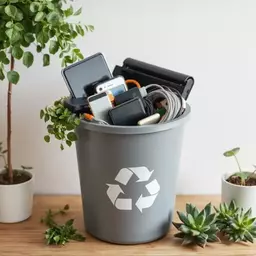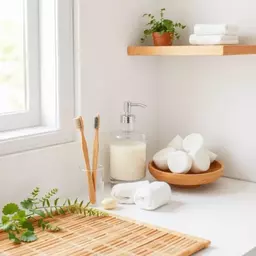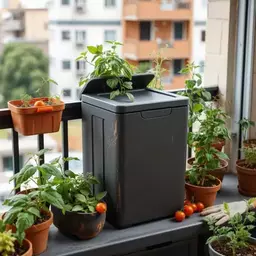As we navigate an era marked by environmental challenges, making sustainable choices is not just beneficial but essential. The adoption of reusable products can play a pivotal role in reducing our ecological footprint and promoting a healthier planet. Are you ready to transform your daily habits and contribute to a sustainable future?
What You Will Learn
- Understanding the urgent need for sustainable living due to pressing environmental issues such as climate change and plastic pollution.
- Recognizing how the use of reusable products can significantly decrease waste and lower your carbon footprint.
- Exploring the personal benefits of using reusable items, including cost savings, health advantages, and enhanced convenience.
- Learning practical steps to integrate reusable products into your life and kickstart your zero-waste journey.
- Identifying the importance of making informed choices about the products you use and their environmental impact.
- Gaining insights into connecting with like-minded individuals to foster a supportive sustainable living community.
- Discovering innovative ways to repurpose reusable items beyond traditional uses in the kitchen and bathroom.
Key Insights on Reusable Products
Embracing reusable products plays a vital role in reducing waste and promoting sustainability. Below are essential insights regarding their environmental and personal benefits.
Environmental Impact
Choosing reusable products can significantly reduce millions of single-use plastics ending up in landfills each year, helping to alleviate plastic pollution and decrease decomposition times.
Personal Benefits
Adopting reusable products leads to cost savings over time, health benefits from safer materials, increased convenience, and stylish designs that can enhance your lifestyle.
Impact on Waste Reduction
By replacing just one single-use item with a reusable alternative each week, individuals can drastically decrease their overall waste footprint over time.
Supporting Sustainable Practices
Using reusable products encourages sustainable economies and promotes a shift towards environmentally-friendly practices in communities.
Understanding the Role of Reusable Products in Sustainable Living
In today’s world, embracing sustainable living has never been more important. We face pressing environmental challenges, from plastic pollution in oceans to the depletion of natural resources. By choosing to incorporate reusable products into our daily lives, we can make a significant difference, not just for ourselves but for the planet as well.
Sustainable living is about making conscious choices that reduce our ecological footprint. It’s about recognizing that our everyday habits—like shopping, eating, and even cleaning—impact the environment. By adopting simple changes, we can help protect our planet for future generations while enjoying a more fulfilling lifestyle. Consider exploring mindful consumption for sustainable living to deepen your understanding.
Why Sustainable Living Matters Today
The urgency of sustainable living stems from the increasing awareness of our environmental impact. As we continue to consume resources at an alarming rate, the Earth struggles to keep up. Climate change, loss of biodiversity, and pollution are just a few of the critical issues we face.
Many individuals, myself included, feel a sense of responsibility to act. It’s essential to understand how our daily choices contribute to these larger problems. By shifting towards eco-friendly practices, we not only help the environment but also inspire those around us to do the same!
- Protect natural resources
- Reduce waste and pollution
- Support sustainable economies
- Promote healthier lifestyles
Overview of Environmental Impact
Understanding our environmental impact begins with recognizing the waste we produce. For example, millions of single-use plastics end up in landfills each year, taking hundreds of years to decompose. When we actively choose reusable products, we can significantly reduce this waste and promote a cleaner, greener world.
Additionally, reusable products often have a lower carbon footprint compared to their disposable counterparts. By investing in items designed to last, we contribute to a sustainable economic cycle that emphasizes quality over quantity. This change is vital for protecting our planet’s ecosystems.
Benefits of Adopting Reusable Products
Switching to reusable products not only benefits the environment but also offers several personal advantages. For one, there’s the potential for cost savings over time. Investing in durable items means less frequent purchases and reduced waste. Plus, many reusable products are designed with efficiency in mind, making them more practical for everyday use!
Here are some notable benefits of adopting reusable products:
- Cost savings: Reduce the need for constant replacements.
- Health benefits: Many reusable items are made from safer materials.
- Convenience: Enjoy the ease of having reliable, long-lasting products.
- Style: Many reusable products come in trendy designs!
At Eco Habits Daily, we believe that every small change adds up. By making a concerted effort to integrate reusable products into your daily life, you’re taking an impactful step towards a more sustainable future. Let’s explore how we can make these changes in practical and tangible ways!
Frequently Asked Questions About Reusable Products
- What are the main benefits of using reusable products?
Reusable products reduce waste, lower carbon footprints, offer cost savings, promote health through safer materials, and provide convenience.
- How can I start incorporating reusable products into my daily life?
Begin by replacing one single-use item each week with a reusable alternative and create designated spaces for these items in your home.
- Why is it important to make informed choices about the products I use?
Informed choices support ethical brands and practices, ensuring that the products you use have minimal environmental impact throughout their lifecycle.
- What are some innovative ways to use reusable products?
Repurpose old t-shirts as shopping bags, use glass jars for storage, and explore DIY projects with reusable materials for home decor.
- Where can I find more information on sustainable living?
Utilize online blogs, books, workshops, and community events focused on eco-friendly practices to deepen your understanding.
Pro Tip
Did you know? By choosing reusable products that are made from sustainable materials, such as bamboo or stainless steel, you not only reduce waste but also support eco-friendly manufacturing practices. Investing in quality reusable items can lead to a healthier planet and may even inspire others to follow your example!
Summarizing Key Insights on Best Reusable Products
As we’ve explored throughout this article, embracing a sustainable lifestyle is not just a trend; it’s a necessary shift toward protecting our planet. By incorporating reusable products into our daily routines, we're making a significant impact. These choices contribute to reducing waste and lowering our carbon footprint, all while enjoying the convenience and benefits that come with eco-friendly alternatives.
To effectively summarize our journey through sustainable living practices, let’s recall some key insights. Reusable items, from kitchen products to personal care items, have proven to be both practical and environmentally friendly. They save money in the long run and often provide better functionality compared to their single-use counterparts. Adopting these practices is a step forward for both you and the Earth!
Recap of Sustainable Living Practices
In our quest for sustainability, we’ve uncovered various strategies to make mindful choices. Here’s a quick recap of the best practices:
- Opting for reusable products in the kitchen can drastically reduce waste.
- Switching to eco-friendly personal care items helps in minimizing plastic use.
- Engaging with local communities and sharing tips fosters a collaborative approach to sustainability.
When we make conscious choices, we not only benefit ourselves but also inspire others around us. Remember, every little change counts, and together, we can create a positive ripple effect in our communities!
The Importance of Making Informed Choices
Making informed choices is crucial in our sustainable living journey. It’s not just about knowing what products to use but understanding their impact on the environment. By opting for items that are truly eco-friendly, such as those made from recycled materials or biodegradable substances, we’re supporting ethical brands and practices. For more on reducing waste, see this guide to simple low-waste lifestyle tips.
Additionally, keeping ourselves educated about the lifecycle of products—how they’re made, used, and disposed of—will empower us to make better decisions. This understanding can transform our purchasing habits, leading to a more sustainable lifestyle overall.
Taking Action Toward a Sustainable Lifestyle
Implementing Reusable Products in Daily Life
Adopting reusable products into your daily routine is easier than you might think! Start small and gradually incorporate these items into your life. Here are a few practical steps to kickstart your zero-waste journey:
- Begin by replacing one single-use item with a reusable alternative each week.
- Set up a designated space in your kitchen and bathroom for your reusable items to keep them handy.
- Educate yourself about recycling and composting to ensure waste is managed responsibly.
Transitioning to a sustainable lifestyle is about progress, not perfection. Celebrate your milestones, no matter how small, and remember that every effort contributes to the bigger picture!
Practical Steps to Start Your Zero-Waste Journey
As you embark on this exciting journey, here are some practical steps to consider:
- Conduct a waste audit to identify areas where you can reduce single-use items.
- Replace plastic bags with reusable tote bags when shopping.
- Carry a reusable water bottle to stay hydrated while minimizing plastic waste.
Joining the Movement: Connect With Like-Minded Individuals
Joining the sustainable living movement can be incredibly empowering! Connect with others through online communities, local groups, or social media platforms. Sharing experiences, challenges, and successes creates a supportive network that can help keep you motivated. Also, learn practical advice from this guide to easy eco-friendly habits to start.
Resources for Further Information on Sustainable Living
To deepen your understanding of sustainable living, utilize available resources such as:
- Online blogs and websites focused on eco-friendly practices.
- Books about sustainability and reducing waste.
- Workshops or community events that promote green living.
Encouragement to Share Experiences and Tips
Don't underestimate the power of sharing your journey! Whether through social media or personal conversations, discussing your eco-friendly choices can inspire others. You might even discover new tips and tricks from those around you!
Innovative Ideas for Using Reusable Products Beyond the Kitchen and Bathroom
Finally, think outside the box when it comes to reusable products! Here are some innovative ideas:
- Use old t-shirts as reusable shopping bags or cleaning rags.
- Repurpose glass jars for organization or storage in your workspace.
- Explore DIY projects that utilize reusable materials for home decor.
With a bit of creativity, you can incorporate sustainability into every aspect of your life! At Eco Habits Daily, we’re excited to support you on this journey. Remember, every choice matters in creating a greener future! For those looking to declutter responsibly, consider this eco-friendly junk removal guide.
Recap of Key Points
Here is a quick recap of the important points discussed in the article:
- Embracing sustainable living through reusable products is essential for reducing environmental impact.
- Reusable products help decrease waste, lower carbon footprints, and support sustainable economies.
- Adopting reusable items can lead to personal benefits like cost savings and improved health.
- Start small by replacing single-use items with reusables and create designated spaces for them in your home.
- Connect with like-minded individuals to share experiences and tips on sustainable living.
- Stay informed about the lifecycle of products to make educated choices that align with eco-friendly practices.









